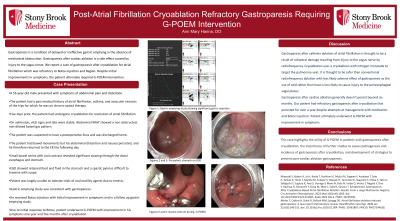Sunday Poster Session
Category: Interventional Endoscopy
P1117 - Post-Atrial Fibrillation Cryoablation Refractory Gastroparesis Requiring G-POEM Intervention: A Case Report
Sunday, October 27, 2024
3:30 PM - 7:00 PM ET
Location: Exhibit Hall E

Has Audio

Ann Mary Hanna, DO
Stony Brook University Hospital
Stony Brook, NY
Presenting Author(s)
Ann Mary Hanna, DO
Stony Brook University Hospital, Stony Brook, NY
Introduction: Gastroparesis is a condition of delayed or ineffective gastric emptying in the absence of mechanical obstruction. Gastroparesis after cardiac ablation is a side effect caused by injury to the vagus nerve. We report a case of refractory gastroparesis after cryoablation for atrial fibrillation which ultimately required G-POEM intervention
Case Description/Methods: A 55-year-old male with history of atrial fibrillation and avascular necrosis of the hips on chronic opioid therapy presented with symptoms of abdominal pain and distention five days after cryoablation for atrial fibrillation. He had no history of diabetes, abdominal surgeries, or symptoms associated with gastroparesis prior. On admission vitals signs and labs were stable. Abdominal XRAY showed a non-obstructed bowel gas pattern. He was suspected to have postoperative ileus due to combination of anesthesia received during ablative therapy and history of opioid use and was discharged home with a bowel regimen. He had bowel movements but persistent abdominal distention and nausea and returned to the ER the next day. CT abdomen imaging showed collapsed small bowel with significant contents in the stomach. Small bowel series with oral contrast was done and revealed significant slowing through the distal esophagus and stomach. EGD showed retained food in the stomach and a spastic pylorus difficult to traverse with endoscope. Patient was unable to tolerate Metoclopramide due to emesis. Opioids were held and gastric emptying study was done, which was consistent with gastroparesis. Patient received botulinum injection with improvement in symptoms and in gastric emptying study. Due to initial response in Botox, he eventually underwent G-POEM with improvement in his symptoms one year and five months after cryoablation
Discussion: Cryoablation is thought to be safer than conventional radiofrequency ablation with less likely adverse effect of gastroparesis as the use of cold rather than heat is less likely to cause injury to the periesophageal vagal plexus injury. Gastroparesis after cardiac ablation generally doesn't persist beyond six months. Our patient had refractory gastroparesis persistent for over a year. He ultimately underwent G-POEM with improvement in symptoms. This case highlights the utility of G-POEM in patients with gastroparesis after cryoablation, the importance of further studies to assess pathogenesis and incidence of gastroparesis after cryoablation, and development of strategies to prevent post-cardiac ablation gastroparesis
Disclosures:
Ann Mary Hanna, DO. P1117 - Post-Atrial Fibrillation Cryoablation Refractory Gastroparesis Requiring G-POEM Intervention: A Case Report, ACG 2024 Annual Scientific Meeting Abstracts. Philadelphia, PA: American College of Gastroenterology.
Stony Brook University Hospital, Stony Brook, NY
Introduction: Gastroparesis is a condition of delayed or ineffective gastric emptying in the absence of mechanical obstruction. Gastroparesis after cardiac ablation is a side effect caused by injury to the vagus nerve. We report a case of refractory gastroparesis after cryoablation for atrial fibrillation which ultimately required G-POEM intervention
Case Description/Methods: A 55-year-old male with history of atrial fibrillation and avascular necrosis of the hips on chronic opioid therapy presented with symptoms of abdominal pain and distention five days after cryoablation for atrial fibrillation. He had no history of diabetes, abdominal surgeries, or symptoms associated with gastroparesis prior. On admission vitals signs and labs were stable. Abdominal XRAY showed a non-obstructed bowel gas pattern. He was suspected to have postoperative ileus due to combination of anesthesia received during ablative therapy and history of opioid use and was discharged home with a bowel regimen. He had bowel movements but persistent abdominal distention and nausea and returned to the ER the next day. CT abdomen imaging showed collapsed small bowel with significant contents in the stomach. Small bowel series with oral contrast was done and revealed significant slowing through the distal esophagus and stomach. EGD showed retained food in the stomach and a spastic pylorus difficult to traverse with endoscope. Patient was unable to tolerate Metoclopramide due to emesis. Opioids were held and gastric emptying study was done, which was consistent with gastroparesis. Patient received botulinum injection with improvement in symptoms and in gastric emptying study. Due to initial response in Botox, he eventually underwent G-POEM with improvement in his symptoms one year and five months after cryoablation
Discussion: Cryoablation is thought to be safer than conventional radiofrequency ablation with less likely adverse effect of gastroparesis as the use of cold rather than heat is less likely to cause injury to the periesophageal vagal plexus injury. Gastroparesis after cardiac ablation generally doesn't persist beyond six months. Our patient had refractory gastroparesis persistent for over a year. He ultimately underwent G-POEM with improvement in symptoms. This case highlights the utility of G-POEM in patients with gastroparesis after cryoablation, the importance of further studies to assess pathogenesis and incidence of gastroparesis after cryoablation, and development of strategies to prevent post-cardiac ablation gastroparesis
Disclosures:
Ann Mary Hanna indicated no relevant financial relationships.
Ann Mary Hanna, DO. P1117 - Post-Atrial Fibrillation Cryoablation Refractory Gastroparesis Requiring G-POEM Intervention: A Case Report, ACG 2024 Annual Scientific Meeting Abstracts. Philadelphia, PA: American College of Gastroenterology.
